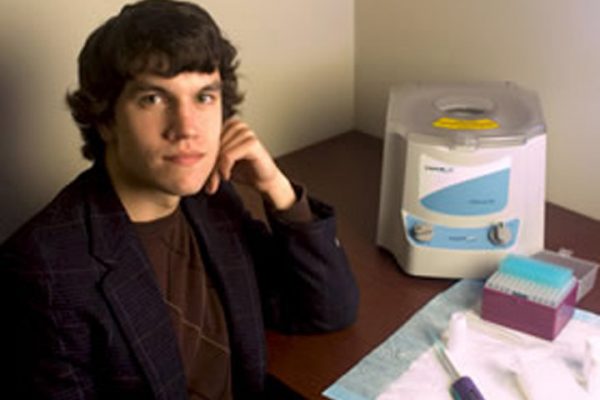
“Females who are able to cope with social threats (being ostracized or rejected) release progesterone, which eases their anxiety and may ensure pro-social behaviors afterward, such as reconnecting with friends or meeting new people.”
“I have always been interested in Psychology. As I was growing up, I would help my mother study for her Psychology courses. I gravitated toward the clinical aspect of the field, which helps the individual, because I believe a disproportionate number of families watch their members suffer from debilitating mental issues,” says Christopher McClure, an Honors student in Psychology.
Chris chose to study at Florida State because of the Department of Psychology’s sterling reputation. “The faculty is well-known, even on an international level, and the professors offer many specific courses, from clinical to social, as well opportunities to gain experience, which matched a variety of my interests.”
Since May 2007, he has been working in the Anxiety and Behavioral Health Clinic. He began as a research assistant, conducting experiments, collecting study data, and training other undergraduate research assistants. Presently he serves as a clinical screener, a position in which he interviews potential patients for existence of anxiety-related disorders and schedules participants for various studies regarding the thought processes associated with these disorders.
It is, however, Jon Maner, assistant professor of Psychology, who has had the greatest influence on Chris. Last semester he began working for this “amazing mentor” in the Social Psychology Lab, where he was able to conduct an independent study on “the maladaptive responses to social rejection on the socially anxious.”
Under Dr. Maner’s supervision, Chris is now working on his Honors in the Major Thesis, “Social Anxiety and Progesterone: Maladaptive Responses to Social Rejection.” He is looking for the biological explanation of antisocial behaviors (withdrawal, isolation). “Specifically, we are looking at the hormone progesterone, which is highly concentrated in females. Females who are able to cope with social threats (being ostracized or rejected) release progesterone, which eases their anxiety and may ensure pro-social behaviors afterward, such as reconnecting with friends or meeting new people.” For his work, Chris was honored with a 2008 Undergraduate Research and Creative Activity Award. He also presented his work at the recent ACC Meeting of the Minds held this year at Florida State.
After graduation in the fall, Chris plans to broaden his studies to include a master’s degree in Public Health, specializing in Social and Behavioral Health, which he believes will better prepare him for serving in the Peace Corps. “I hope to use my training, education, and life experience to assist in community development and to safeguard the health and social well-being of the less fortunate. Later, after obtaining my Ph.D., I plan to continue my humanitarian efforts and to assist our own nation in reforming our health care system.”
Chris knows one thing for certain—”My successes will go as far as the abilities that my mother helped me grow. Without her life experience and guidance, I wouldn’t be here.”




